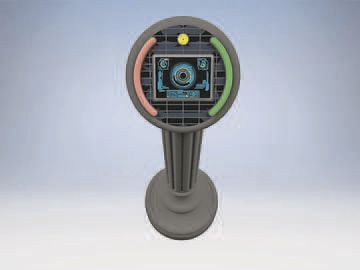By Philip Sean Curran, Staff Writer
Arash Sadeghi’s “awful experience” looking for a parking spot in a major East Coast city inspired the newly minted Princeton University Ph.D to come up with an alternative to driving in circles looking for an on-street spot.
He has developed a way for motorists to find and pay for parking through an app on their smartphone or mobile device working with sensors, colored beacons and cameras in parking meters. The concept will be tested on the streets of Princeton starting next spring, with the goal to launch in three more U.S. cities after that.
He has arranged with the municipality to rent 10 metered parking spaces, at locations still to be determined, in an experiment lasting up to 60 days. He will need participants willing to use the technology, at no cost to them, when they are driving in town. A marketing campaign will launch later this year.
“This is a problem, I think, worth solving. The experience could be a lot better than what it is right now,” he said Monday of parking.
He believes the penetration of smartphones in this market and the challenge to park in town makes Princeton the right place to test his innovation.
“The users are going to be anybody who drives and parks,” he said. “This is what I mean by like a Zeitgeist changing, sort of changing the way people approach parking.”
Mr. Sadeghi, 31, was born in Iran and went to school in Great Britain. He arrived in Princeton in 2010 for graduate school, where he earned his doctorate in electrical engineering.
“By design, I like to build things — build software, build hardware, build companies,” he said seated at a table at the back of Small World Coffee. “The satisfaction I get out of it is taking this from like a whiff of an idea, from an idea stage to, a sort of self-sustained company.”
Since earning his degree, the entrepreneur started his own business, Possumus Inc., and enlisted the help of four Princeton undergraduates who took an engineering course he had taught at the university, Chloe Song, Kevin Wang, Vincent Po and Zachary Kendrick.
The impetus for the parking app came after Mr. Sadeghi went to Philadelphia on a business trip, a “nightmare” experience of trying to get a parking spot, in his words.
“It was horrible,” he said. “Driving in Philadelphia and trying to park, it was just (a) nightmare. I was like, something’s got to be done about this.”
His app is GPS-based and can be used in a few ways. Motorists can set their destination ahead of time and let the technology tell them where parking is as they get closer to where they’re going. Or the app can locate and call up available spots in the immediate radius of where motorists happen to be at the moment. Another method is to see a meter flashing green and park there.
For the experiment, the town’s meter heads will be removed and his company’s meters put in, equipped with cameras that see if spots are available and then relay that information wirelessly.
To enlist customers, he will reach out to businesses along the street where the parking meters in the study are located. Marketing also will be on online and through social media; a company website, www.possumus.co, is due to go up next week. Study participants will be given credit in their accounts to use the spots, with no actual money being collected for parking.
For its part, the town rented the 10 spaces through an agreement during the study period.
“It looks interesting,” said town engineer Deanna Stockton by phone Monday. Her department will have a hand in determining which parking spots are chosen for the experiment.
During that time, Mr. Sadeghi and his team will observe how people are using the system, seeing where there are hiccups and tweaking things as need be.
“The point,” he said, “is to make the app as user-friendly as possible.”

